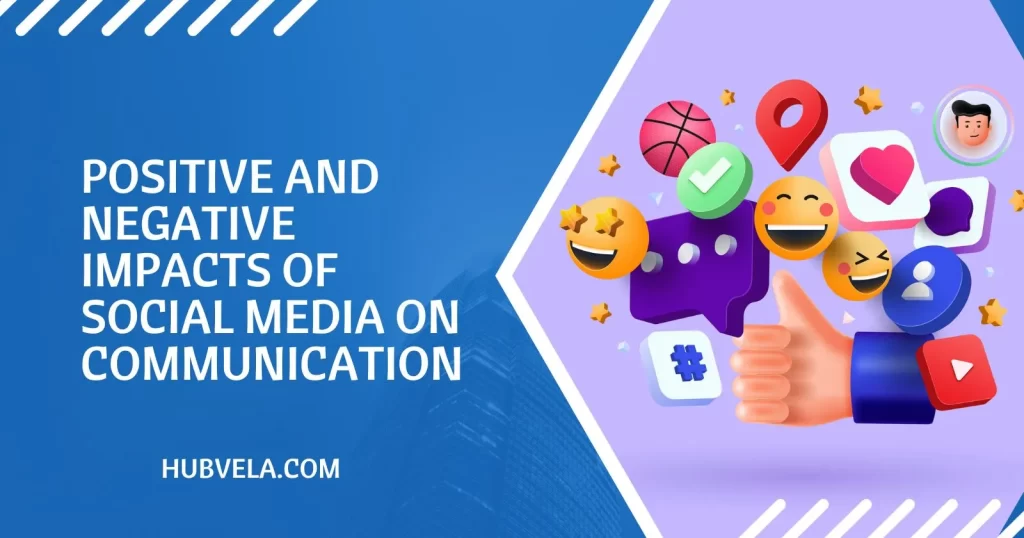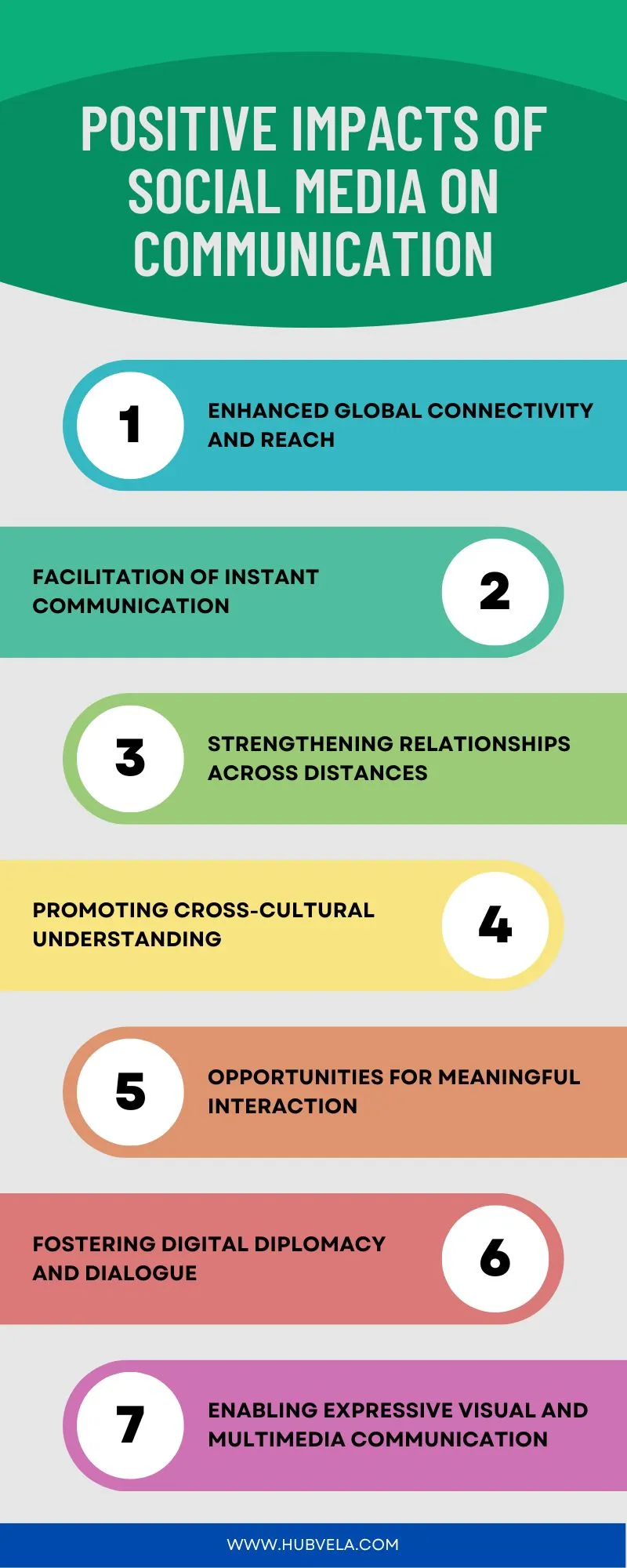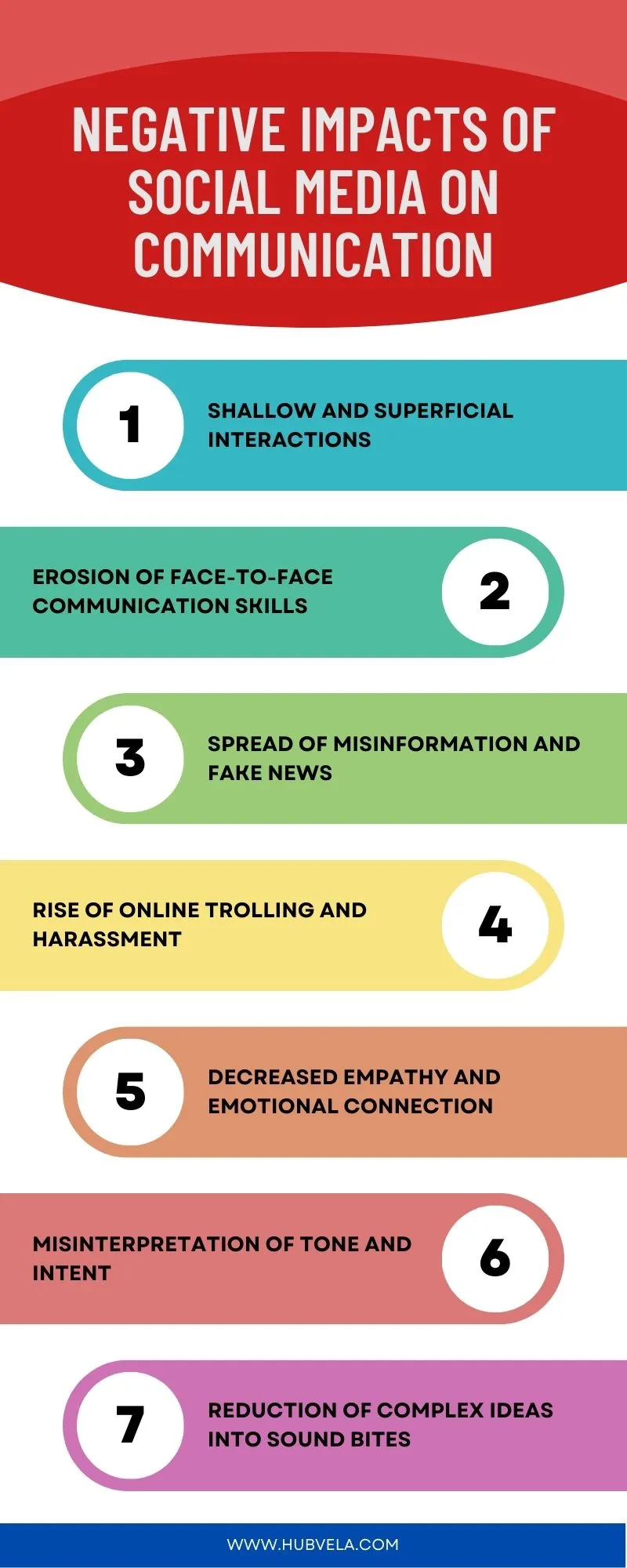Social media has become an integral part of our lives, affecting the way we communicate with one another.
While it has brought about many positive changes, such as increased social support and the ability to connect with people from different cultures and places, it has also been associated with negative effects, such as anxiety, depression, and envy when making social comparisons leading to lower self-esteem and wellbeing.
In this article, we will explore the positive and negative impacts of social media on communication, and how it has reshaped the way we interact with one another.

--Advertisement--
Positive Effects of Social Media on Communication
Social media has become an integral part of our daily lives, and it has transformed the way we communicate with each other.
While there are concerns about the negative effects of social media on communication, there are also positive effects that cannot be ignored. We will explore the positive effects of social media on communication.
Despite the challenges that come with social media, it has undoubtedly changed the way we communicate and interact with each other, and it is important to recognize the positive impact it has had on communication.

1. Enhanced Global Connectivity and Reach
One of the significant positive effects of social media on communication is the enhanced global connectivity and reach it provides.
Social media platforms have connected people from all corners of the world, breaking down geographical barriers and allowing individuals to communicate and interact with each other regardless of their location.
Through social media, people can easily connect with friends, family, and even strangers from different countries, fostering cross-cultural understanding and promoting global collaboration.
This increased connectivity has also opened up new opportunities for businesses and organizations to reach a global audience, expanding their customer base and facilitating international partnerships.
Social media has truly revolutionized communication by enabling individuals and businesses to connect and engage on a global scale.
2. Facilitation of Instant Communication
Social media has revolutionized communication by facilitating instant messaging and conversations. With social messaging, customers can engage in direct and personal conversations with brands, which has transformed the way people interact with them.
Instant messaging apps like WhatsApp have redefined the culture of IMs and taken it to a whole new level, allowing people to text anyone across the globe as long as they have an internet connection.
Social media and instant messaging apps offer a number of benefits that can be leveraged to improve life, including staying connected with friends and family, staying up-to-date on current events, finding new friends, expanding social networks, promoting businesses or personal brands, and connecting with like-minded people.
In business, instant messaging systems enable immediate communication between two parties in written form, which is beneficial for team members working on the same project, HR teams using polls to establish employee opinions and attitudes, and companies using their websites to sell products and provide customer support.
3. Strengthening Relationships Across Distances
Social media has been found to be a helpful tool in strengthening relationships across distances, particularly in long-distance relationships.
Social media platforms provide instant access to communication, allowing individuals to stay connected and maintain frequent communication with their loved ones.
Studies have found that the communicative use of social media can increase bonding capital and reduce loneliness among college students.
Social media can also be used as a positive reinforcement tool, where couples can give each other public shoutouts or write heartfelt messages that everyone will see, including mutual friends.
Additionally, social media has become a staple in long-distance family communication, providing a way to stay connected with loved ones who live far away.
Social media has been a game changer for long-distance relationships, allowing couples and families to stay connected and share their lives despite the distance.
4. Promoting Cross-Cultural Understanding
Promoting cross-cultural understanding is one of the positive effects of social media on communication. Social media platforms allow people from different cultures and backgrounds to connect and interact with each other, breaking down barriers that may have existed in the past.
Through social media, people can learn about different cultures, traditions, and customs, and gain a better understanding of the world around them. This can lead to increased empathy and tolerance towards people who are different from themselves.
Social media also provides a platform for people to share their own culture and experiences with others, promoting cultural exchange and appreciation. Social media has the potential to promote cross-cultural understanding and bring people closer together.
5. Opportunities for Meaningful Interaction
Social media platforms provide numerous opportunities for meaningful interaction among individuals. These platforms allow people to connect and communicate with others from all around the world, breaking down geographical barriers.
Through social media, individuals can engage in conversations, share ideas, and collaborate on various topics of interest. This opens up avenues for diverse perspectives and knowledge exchange.
Additionally, social media provides a platform for individuals to find like-minded communities and support networks, fostering a sense of belonging and connection.
Whether it’s through commenting on posts, participating in group discussions, or joining online communities, social media offers opportunities for meaningful interaction that can enhance communication and promote positive relationships.
6. Fostering Digital Diplomacy and Dialogue
Fostering Digital Diplomacy and Dialogue is an important aspect of the positive effects of social media on communication.
By embracing digital platforms and technologies, diplomats can transcend physical boundaries, foster understanding, and build bridges between nations.
Digital diplomacy allows for cultural exchange and mutual understanding, facilitating people-to-people connections and promoting positive perceptions of a nation.
It provides a holistic approach toward diplomacy, utilizing digital tools and methods to deal with cyber threats and engage in international negotiations.
The practice of digital diplomacy has disrupted traditional diplomacy, challenging traditional ways of doing diplomacy and opening up new opportunities for theoretical advancement.
Through social media and other digital platforms, diplomats can engage with audiences and create virtual diplomatic networks, enhancing dialogue and communication on a global scale.
Digital diplomacy plays a crucial role in promoting positive communication and fostering dialogue between nations in the 21st century.
7. Enabling Expressive Visual and Multimedia Communication
Social media has undeniably transformed the way we communicate and interact with each other. One of the positive effects of social media on communication is enabling expressive visual and multimedia communication.
Social media has introduced new forms of visual communication, collaboration, and networking. Platforms like Instagram, TikTok, and YouTube allow users to share photos, videos, and other multimedia content with their followers.
This has made it easier for people to express themselves creatively and share their experiences with others.
Social media has also made it easier for businesses to create brand awareness and promote their products through visual content.
However, it is important to acknowledge that exposure to messaging and information overload can also have negative effects on communication.
Negative Effects of Social Media on Communication
Social media has become an integral part of our daily lives, and it has revolutionized the way we communicate with each other. However, the impact of social media on communication is not always positive.
In fact, there are several negative effects of social media on communication that have been identified by researchers. We will explore the negative effects of social media on communication.

1. Shallow and Superficial Interactions
Social media often promotes superficial relationships, which might hinder the development of deep, meaningful connections.
The convenience of online communication might lead to a decline in face-to-face interaction, reducing the opportunity for deeper conversations and connections.
With low-dimensional communications, people tend to hop from person to person and swap depth for breadth, leading to weaker ties being formed and more superficial conversations.
Additionally, people may not represent themselves truthfully online, which can lead to misunderstandings and miscommunications.
Sherry Turkle, an MIT professor, argues that many of our online connections are, by design, shallow and superficial. Social media can have a negative impact on communication skills by promoting shallow and superficial interactions.
2. Erosion of Face-to-Face Communication Skills
The rise of social media has led to a decline in face-to-face communication skills. People are more likely to communicate through social media platforms rather than in-person, which can lead to unfiltered conversations and a decrease in the quality of what is being talked about.
Excessive use of social media can also cause people to rely more on technology than on people, which can increase the value one puts on social media versus the value put on intimate friendships.
Verbal and nonverbal indications associated with face-to-face interactions are more intimate, and these social cues can only become natural through constant physical interaction.
Therefore, the erosion of face-to-face communication skills is a negative effect of social media on communication.
3. Spread of Misinformation and Fake News
The spread of misinformation and fake news is a significant negative effect of social media on communication. Social media platforms like Twitter, Facebook, YouTube, and Instagram play a critical role in disseminating information rapidly and widely.
However, this also means that false information can spread quickly and reach a large audience.
Misinformation on social media can lead to an increase in erroneous interpretations of scientific knowledge, opinion polarization, fear, and panic, and decreased access to healthcare.
Studies have found that a significant proportion of health misinformation on social media is associated with topics such as vaccines, COVID-19, and pandemics.
Fake news and misinformation can have a powerful ripple effect, influencing others to see them as facts, which can be especially dangerous for children and young people who may develop distorted views of the world.
The spread of false information on social media can also contribute to mistrust in credible institutions and exacerbate social conflict.
It is crucial for social media users to be aware of the potential for misinformation and to critically evaluate the information they encounter online.
4. Rise of Online Trolling and Harassment
The rise of online trolling and harassment on social media has had significant negative effects on communication. Online anti-social behavior, such as trolling, can lead to decreased satisfaction with technology and overall well-being.
It has been found that online hate and harassment can cause depression, isolation, social anxiety, and self-doubt for both victims and observers. This is particularly concerning for teenagers, as overuse of social media can lead to mental health problems.
Cyberbullying, offensive name-calling, spreading false rumors, and sharing explicit photos without consent are some of the forms of online harassment that individuals experience.
The impact of trolling and online harassment is not limited to individuals but also affects the overall online environment. Trolls can drown out the voices of marginalized groups, leading to self-censorship and a chilling effect on open communication.
It is important to address and mitigate the negative effects of online trolling and harassment to create a safer and more inclusive online space for communication.
5. Decreased Empathy and Emotional Connection
Social media can impede empathy and emotional connection in individuals. Spending too much time on social media and not enough time communicating face-to-face can lead to a decrease in empathy and an erosion of our ability to connect with others.
Social media can also promote constant arguing online, which can hinder progress due to a lack of empathy. However, it is important to note that not all studies agree on the negative effects of social media on empathy.
One study found that social media use is related to an increase in cognitive and affective empathy over time.
Nonetheless, it is clear that social media can have a significant impact on our ability to empathize with others, and it is important to be mindful of this when using social media.
6. Misinterpretation of Tone and Intent
Misinterpretation of Tone and Intent can have negative effects on communication, especially in written forms such as emails or online messages.
The tone of a message can often be misinterpreted, leading to misunderstandings, damaged relationships, and even conflicts. For example, someone may perceive a serious or urgent tone as yelling or hostility, when that may not be the intention.
This misinterpretation can escalate the situation and lead to unnecessary arguments or tension. It is important to be aware of the tone we use in our communication and to clarify any misunderstandings by asking for clarification or providing context.
Paying attention to tone indicators, subject lines, salutations, and closings can also help in accurately interpreting the tone and intention of an email or message.
By being conscious of our tone and ensuring it aligns with our message, we can avoid misinterpretation and promote effective communication.
7. Reduction of Complex Ideas into Sound Bites
The reduction of complex ideas into sound bites is a common phenomenon on social media platforms and can have negative effects on communication.
Due to the limited character count and attention span on social media, complex ideas, and nuanced discussions are often simplified and condensed into short, catchy phrases or headlines.
This can lead to the oversimplification of complex issues, the spread of misinformation, and the polarization of opinions.
Instead of engaging in thoughtful and in-depth conversations, social media users may rely on quick and superficial information, which can hinder meaningful dialogue and understanding.
The reduction of complex ideas into sound bites on social media can contribute to the spread of misinformation, the reinforcement of echo chambers, and the erosion of critical thinking skills.
It is important to be aware of this phenomenon and seek out reliable and comprehensive sources of information to gain a more accurate understanding of complex issues.
Conclusion on Positive and Negative Impacts of Social Media on Communication
In conclusion, social media has both positive and negative effects on communication. While it has brought people together and enhanced businesses, it has also caused people to become isolated from the real world and prefer online communication over actual conversations.
The excessive use of social media can lead to decreased productivity, cyberbullying, and the spread of hate speech and misinformation. The negative effects of social media outweigh the positive, and it is important to use social media responsibly and be mindful of its effects.
The effects of social media are complex and vary from person to person, and more research is needed to understand the direct and clear causation.
People need to change their destructive patterns of social media use before it destroys society. Overall, social media has revolutionized mass communication, but it is important to be prudent about how to use it.



Hi, I am Venkatapanchumarthi,
This post is very nice. this post helped me a lot .I love to read this article. This article helped me a lot. Thanks for sharing such a useful information.
Thank you for the kind words. Keep visiting and reading.